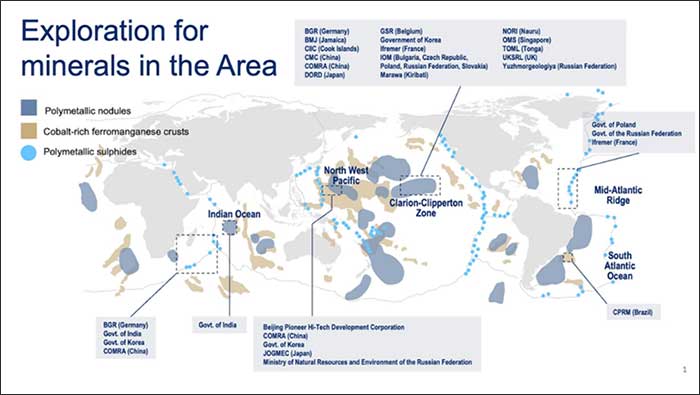Date : 03/08/2023
Relevance:
-
GS Paper 1: Resource,
-
GS Paper 3: Security
Keywords: Deep Sea Mining, Deep Ocean Mission, Coastal Observation Systems, Environmental Conservation, Blue Economy.
Context:
India's progress in the fields of deep-sea mining and coastal observation systems marks a significant stride towards harnessing the vast potential of its maritime resources. The nation's scientific and technological advancements are driven by the Deep Ocean Mission and the innovative development of coastal observation infrastructure. However, these achievements also bring forth concerns about the environmental impact and the need for sustainable practices.
Deep Sea Mining: Unlocking Oceanic Resources
The International Seabed Authority, a United Nations regulatory body, is preparing to resume negotiations that could potentially allow for deep sea mining. This form of mining involves extracting mineral deposits and metals from the ocean's seabed, including valuable materials critical for the green energy transition. However, concerns about its environmental impact and the need for regulatory measures remain.
Understanding Deep Sea Mining:
Deep sea mining encompasses the removal of mineral deposits and metals from the ocean floor. There are three main types: collecting poly-metallic nodules, mining massive seafloor sulphide deposits, and extracting cobalt crusts from rocks. These deposits contain materials like nickel, rare earths, and cobalt, which are essential for renewable energy technologies, batteries, and everyday electronics.
Regulation of Deep Sea Mining:
What is the International Seabed Authority?
About:
- The ISA is an autonomous organization within the United Nations common system, with headquarters located in Kingston, Jamaica.
- All States parties to the 1982 UNCLOS are members of the Authority, amounting to 168 members, including the European Union.
- The Authority is one of the three international institutions established by UNCLOS;
- The other two are the Commission on the Limits of the Continental Shelf and the International Tribunal for the Law of the Sea.
Objective:
- Its primary function is to regulate exploration for, and exploitation of deep seabed minerals found in 'the Area', which is defined by the Convention as the seabed and subsoil beyond the limits of national jurisdiction, that is, beyond the outer limits of the continental shelf.
- The Area comprises just over 50 % of the entire seabed on Earth.
Maritime territories and exclusive economic zones are managed by individual countries, while the high seas and international ocean floor are governed by the United Nations Convention on the Law of the Sea. This convention applies to states regardless of whether they have signed or ratified it, ensuring a comprehensive framework for governing deep sea mining activities.
Environmental Concerns:

One major concern surrounding deep-sea mining is the potential damage to ecosystems. Given that only a small portion of the deep seabed has been explored, conservationists worry about the impact of mining operations without sufficient environmental protocols in place. Potential environmental consequences include noise, vibration, light pollution, leaks, spills of fuels and chemicals, and sediment plumes generated during the mining process.
Sediment plumes generated by some mining techniques pose significant risks. After extracting valuable materials, slurry sediment plumes are sometimes pumped back into the sea, causing harm to marine life in various ways. These plumes can affect the water's quality, interfere with ecosystems, and potentially harm delicate organisms.
Striking a balance between development and conservation remains crucial to mitigate environmental risks.
Deep Ocean Mission: Empowering India's Maritime Advancements
India's Deep Ocean Mission is a multi-faceted endeavor that encompasses exploring, conserving, and utilizing deep-sea resources. The development of manned submersible and integrated mining systems are integral components of this mission. By exploring deep-sea biodiversity, India seeks to tap into bio-prospecting opportunities for sustainable utilization of marine resources. Furthermore, the exploration of offshore ocean thermal energy conversion holds promise for energy and freshwater production.
Coastal Observation Systems: A Boost to Weather Forecasting
India's state-of-the-art coastal observation and water quality nowcasting system signifies its commitment to improving weather forecasting in coastal regions. The integration of radar and satellite observations allows for real-time data processing, enabling accurate weather projections several hours in advance. This system empowers coastal communities, industries, and authorities with timely information for informed decision-making and resource management.
Blue Economy Initiatives: Promoting Sustainable Development
In line with India's commitment to the blue economy, several initiatives have been launched to foster sustainable coastal development. The India-Norway Task Force on Blue Economy, Sagarmala project, O-SMART, Integrated Coastal Zone Management, and National Fisheries Policy underscore the nation's focus on harnessing marine resources responsibly. These initiatives aim to balance economic growth with environmental conservation.
Conclusion:
India's strides in deep sea mining and coastal observation systems represent remarkable advancements in its maritime domain. The Deep Ocean Mission and coastal observation infrastructure showcase the nation's commitment to responsible exploration and sustainable practices. While deep-sea mining offers opportunities for resource extraction, mitigating environmental impact through robust regulations is essential. The amalgamation of innovative technology and sustainable practices will shape India's future as a responsible custodian of its maritime frontiers.
Probable Questions for UPSC Main Exam:
- What are the key environmental concerns associated with deep sea mining, and how can India strike a balance between resource extraction and conservation to ensure responsible maritime development? (10 Marks,150 Words)
- Discuss the significance of India's Deep Ocean Mission in advancing scientific capabilities and promoting sustainable utilization of deep-sea resources. How can the mission contribute to India's efforts in the green energy transition? (15 Marks, 250 Words)
Source : The Indian Express








